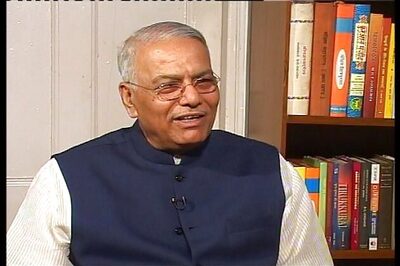
views
New Delhi: China's president will kick off his first South Asia tour with a visit to Beijing's latest investment in Sri Lanka, a $1.4-billion port city development to include a marina and a Formula One track -- all just 250 kilometres from India's coast.
Xi Jinping's trip to the site, next to a major Chinese-funded commercial port, will provide a vivid reminder of Beijing's growing economic clout in India's backyard ahead of his maiden visit to New Delhi next week.
Despite his hardline nationalist reputation, India's new Prime Minister Narendra Modi moved quickly to engage with traditional rival China after taking office in May, inviting Xi to India.
But he has also sought to stop India's neighbours falling further into China's embrace, choosing Bhutan and Nepal for his first foreign trips as prime minister and extending an olive branch to arch-rival Pakistan.
That may not worry China too much. Modi's close relationship with Tokyo, on the other hand, is likely to raise alarm bells in Beijing that analysts say he may be able to use to his advantage.
Modi enjoys a particularly warm friendship with his Japanese counterpart Shinzo Abe, who welcomed him even as he was shunned by Western powers over claims he failed to stop deadly religious riots in Gujarat, the state he used to run.
Both India and Japan are wary of what many see as Beijing's growing territorial assertiveness, and Washington is eager for them to step up their cooperation by way of counterweight to China.
"China is concerned that we would get closer to Japan and to the US under Modi. They don't want that to happen," said Jayadeva Ranade, president of the Centre for China Analysis and Strategy in New Delhi.
Ranade said this could give New Delhi valuable leverage in its negotiations with Beijing, after Japan pledged during a recent visit by Modi to double its investment in the country over the next five years.
Focus on investment
Liu Jianchao, assistant minister of foreign affairs, said this week Xi would discuss investment in India's railways as well as nuclear cooperation during his visit.
Developing India's crumbling infrastructure is a key priority of the Modi government, which has said it will upgrade existing railways and build the country's first high-speed train line.
Liu also said the two sides would seek to push forward negotiations on their disputed border during Xi's visit.
While the frontier between China and India has never been formally demarcated, the two sides have signed accords, and analysts said Beijing was eager to maintain the peace with its western neighbour.
Both sides will "emphasize the points of convergence" during Xi's visit, focusing on trade and investment as well as international cooperation, political analyst Shyam Saran told AFP
"It is quite apparent that China is looking at India under Modi as a serious and credible partner as well as potential adversary," said Saran, a former foreign secretary and senior fellow at the Centre for Policy Research in New Delhi.
China offered reassurances ahead of the visit that it is not seeking to "encircle" India -- a long-held fear in some quarters given Beijing's closeness to neighbouring Pakistan and growing investment in Sri Lanka, Bangladesh and the Maldives.
"China sees India as a development partner," Liu told reporters in Beijing. "China has not and will not encircle India."
Relations between the nuclear-armed neighbours are still characterised by mutual suspicion, in large part as a legacy of a brief but bloody war in 1962.
But India is rolling out the red carpet for Xi, who will begin his visit in the prime minister's home state of Gujarat on September 17 -- Modi's 64th birthday.
Xi will begin his tour of South Asia on September 14 in the Maldives, according to Chinese state media, where Beijing has been expanding its presence, setting up a full embassy in 2011.
From there he will head to Sri Lanka, where China has invested heavily, building a deep-sea harbour and an international airport in an area that straddles the main east-west international shipping lane, the world's busiest trade route.
Plans for a military aircraft service facility with Chinese investments remain in limbo following concerns privately expressed by India.
China has also invested heavily in Bangladesh, financing one of the country's largest coal-fired power plants and several key infrastructure projects.
Critics say India's previous government, led by the centre-left Congress party, failed to take a sufficiently strong line on China while also neglecting its South Asian neighbours.
But Ranade predicted that would change under the Modi government, whose Foreign Minister Sushma Swaraj said this week India's relationship with China was one of both "cooperation and competition".
"The Modi government will draw some red lines," he told AFP.




















Comments
0 comment